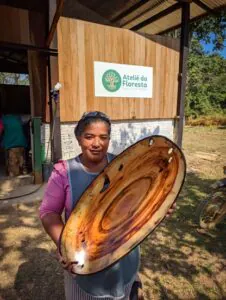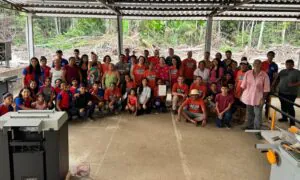July 18, 2024
Fallen trees in works of art

In the Amazon, local communities are changing their lives through innovative projects that turn fallen trees into furniture, works of art and high-value products. Among these initiatives are Ateliê da Floresta and Movelaria Comunitária Sustentável, projects supported by LIRA/IPÊ – Legado Integrado da Região Amazônica, which create new opportunities, generate income and promote a more sustainable future for the region.
“These initiatives demonstrate that it is possible to combine environmental conservation with economic development, bringing benefits to both the forest and its inhabitants,” says Fabiana Prado, manager of LIRA/IPÊ, an initiative of the Institute for Ecological Research (IPÊ) dedicated to forest preservation and the development of community businesses in the Amazon.
Forest Workshop
Opened on June 9, 2024, Ateliê da Floresta, located in the Chico Mendes Extractive Reserve in Xapuri, Acre, transforms waste wood into art, furniture and utensils, creating a new source of income and pride for the community. Conceived by Raimundo Mendes de Barros, known as Raimundão, and other leaders of the agro-extractivist movement in Acre, the project came to fruition with the support of LIRA/IPÊ and SOS Amazônia’s Nossabio – Conserved Territories project.
Since its first exhibition, Ateliê has attracted interest from galleries in Manaus and São Paulo. Built by SOS Amazônia in partnership with Amoprex (Association of Residents and Producers of the Chico Mendes Extractive Reserve in Xapuri) and with the support of LIRA/IPÊ, the Atelier not only generates income, but also helps to conserve the forest, keeping Chico Mendes’ ideals alive. “They called me a gaga, a crazy old man with crazy ideas, just like they called Chico Mendes. He dreamed that one day the caboclos would be considered equal to those in the city. Just because we were born in the bush, don’t we have the same rights?” said Raimundão at the inauguration.

The development of the project involved meetings with the community, training artisans, management and association workshops, market consultancy, the acquisition of tools and machinery, the creation of a visual identity manual and obtaining a license for the sustainable use of wood. ICMBio licensed 50 cubic meters of wood from 20 different species.
“Ateliê da Floresta has been a symbol of struggle and persistence for 14 years. It represents a dream come true for our community and serves as an example to others, showing that the standing forest is worth much more. We work with forest waste, transforming it into handicrafts that tell our story of struggle and conservation. This project is already generating funds and is expected to generate significant income for each family involved,” says Rogério Azevedo de Barros, Raimundão’s son.
“The initiative has attracted mainly young people and women, which is very positive. The workshop currently involves 18 families, but the intention is to gradually expand. To do this, it will be essential to invest more in training, management and maintaining fair relations with the market. These are the next steps,” says Adeilson Lopes, SOS Amazônia’s technical coordinator.
Sustainable Community Furniture
In the Igapó-Açú Sustainable Development Reserve (RDS), a new chapter of hope and innovation began with the inauguration of the Sustainable Community Furniture Store in May 2024. Coordinated by the Igapó-Açú Managers’ Cooperative (Coopmaia), the furniture factory transforms sustainably managed wood into furniture and other high-value products, playing a crucial role in the region’s sustainable development.
“Furniture making in the Igapó-Açú RDS not only improves the local economy, but also values education and the involvement of young people, transforming the old feeling of shame at being from the interior into pride. Residents can now buy windows and furniture locally, something that was previously inaccessible. Setting up the furniture store was difficult and required a lot of effort from the community, but with determination, things began to change. Located on the BR-319 highway, it is the only furniture store in the region that uses wood from managed forests. The team continues to organize itself, and the community is confident that this is just the beginning of a prosperous future, bringing more development and pride to everyone,” says Doracy Dias, president of COOPMAIA.
Part of the Madeira-Purus Forest Cities project, the creation of the furniture store was only possible thanks to the collaboration between IDESAM (Amazon Institute for Conservation and Sustainable Development), the NGO Casa do Rio and the State Secretariat for the Environment and Sustainability (SEMA), with financial support from LIRA/IPÊ. Design professionals such as Frederico Felipe and Rodrigo Silveira left ideas and prototypes for the community to produce independently.
“The furniture is an important achievement for the communities, making it possible to add income by making small objects from managed wood, with greater added value and ease of transportation. Together with the community, we opted for a product that is scalable, easy to manufacture and uses little raw material, without depending on external factors. Built by the residents themselves, this furniture store represents the community’s drive and protagonism, promising good results for everyone,” says Marcus Biazzatti, IDESAM’s technical coordinator.
How LIRA Supports Sustainable Development in the Amazon
Founded by biologist Fabiana Prado, LIRA/IPÊ aims to improve conservation efforts in the Amazon biome by funding socio-environmental impact projects, promoting the generation and dissemination of knowledge and supporting public policies aimed at Amazon conservation and climate resilience.
Since its foundation, LIRA/IPÊ has collaborated with more than 125 organizations in five states, managing 50 projects in 59 protected areas. The initiative seeks not only to conserve the forest, but also to integrate and generate knowledge, as well as engaging women to play a greater role, since they play a fundamental role in the socio-economic fabric of the region. More than 58 million hectares of forest have been conserved, directly benefiting 52,000 people in 62 municipalities, with an investment of R$46 million in impact projects that promote socio-environmental practices. LIRA/IPÊ is the Amazon Fund’s largest CSO (Civil Society Organization) project and the second largest conservation project in the Amazon.
About LIRA
LIRA – Legado Integrado da Região Amazônica (Integrated Legacy of the Amazon Region) is an integrative initiative that boosts conservation efforts in the Amazon through three components: 1) The LIRA Fund, which finances socio-environmental projects with traditional peoples and communities; 2) Knowledge Management and Innovation; and 3) Socio-environmental Public Policies. It brings together a network of 125 organizations working in five states in the Amazon biome, carrying out 50 projects in 59 protected areas, promoting biodiversity conservation, the well-being of traditional peoples and communities and climate resilience.


